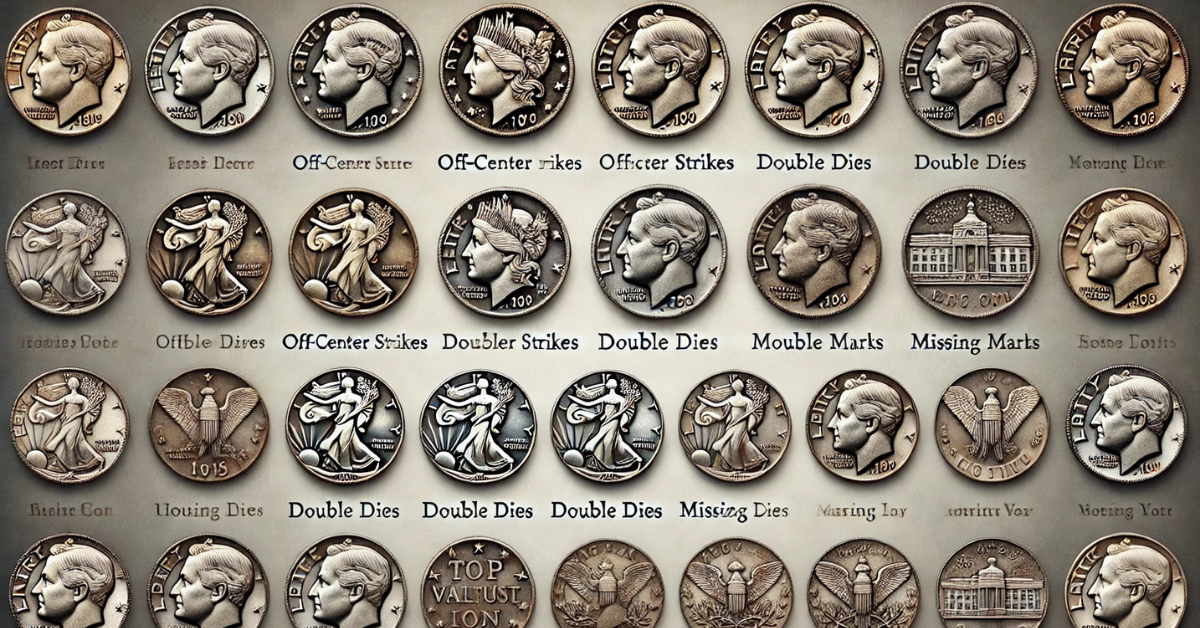Roosevelt dimes may be among the most common U.S. coins, but some error varieties are highly valuable due to minting mistakes, missing mint marks, or unique anomalies. These errors turn ordinary dimes into sought-after collectibles. Here’s a closer look at the top 10 Roosevelt dime errors every coin enthusiast should know.
1. 1996-W Roosevelt Dime
The 1996-W Roosevelt Dime was minted at the West Point Mint to celebrate the coin’s 50th anniversary. With a limited mintage of 1.457 million, it’s a rare find in circulation.
- Value:
- MS65: $10–$16
- MS67 or higher: Up to $45
2. 1982 No-Mintmark Strong Roosevelt Dime
In 1982, a mint error resulted in some dimes being struck without the “P” mint mark, a first for coins minted in Philadelphia. Only 75,000 of these coins exist.
- Value:
- Weak strike: Less valuable
- Strong strike (MS65): Up to $2,185
3. 1965 Transitional Roosevelt Dime
When the U.S. Mint switched from 90% silver to copper-nickel in 1965, a small number of dimes were mistakenly struck on 1964 silver planchets, creating a transitional error.
- Value:
- Typical examples: Up to $3,000
- Gem condition: Up to $9,000
4. 1969-D Roosevelt Dime with Repunched Mint Mark
This error features a repunched “D” mint mark and doubling in “IN GOD WE TRUST,” making it a collectible anomaly.
- Value:
- Typical condition: $100
- Perfect condition: Up to $1,500
5. 1964-D Roosevelt Proof Dime
The last 90% silver Roosevelt dime, this coin was only available as a proof and never circulated.
- Value:
- Regular proof: Up to $525
- Deep Cameo (DCAM) in MS70: Up to $4,600
6. 1968-S No Mint Mark Roosevelt Dime
The first proof coin in the Roosevelt series with a missing “S” mint mark, this error is exceptionally rare, with only a few dozen known examples.
- Value:
- A PF67 example sold for $40,250 at auction in 2008
7. 1999-D Broad Struck on a Cent Planchet
This error occurred when a dime was mistakenly struck on a cent planchet, resulting in an unusual size and copper color. Only two examples are known.
- Value:
- Graded MS65: Sold for $10,000 at auction
8. 1998-P Cluster of Roosevelt Dimes
A malfunctioning coining press created a bonded cluster of 32 dimes stuck together, an extraordinary mint error.
- Value:
- Sold for $9,200 at auction
9. 1969-D Missing Clad Layer Roosevelt Dime
This error occurs when a coin is struck without one of its outer layers, exposing the copper core underneath.
- Value:
- Typical condition: $50–$100
- Higher grades: Potential for increased value
10. 1970-S No Mint Mark Roosevelt Dime
Another proof dime struck without the “S” mint mark, following the 1968-S error. Fewer than 500 examples are believed to exist.
- Value:
- A PF69 example sold for $1,610 at auction
Tips for Identifying Valuable Roosevelt Dime Errors
- Inspect Mint Marks: Look for missing or repunched mint marks on 1982, 1968-S, and 1970-S dimes.
- Search for Transitional Errors: Focus on 1965 dimes that may have been struck on 90% silver planchets.
- Examine for Missing Layers: Missing clad layers expose the copper core and create visually striking errors.
- Inspect Proof Coins: Limited mintage proof dimes, like the 1964-D and 1968-S, are highly collectible.
- Grade Your Coins: Higher grades significantly enhance value. Consider professional grading through services like PCGS or NGC.
Why Collect Roosevelt Dime Errors?
Roosevelt dime errors combine historical intrigue, rarity, and aesthetic appeal, making them an exciting pursuit for collectors. From transitional errors to unique minting mistakes, these coins can turn everyday pocket change into treasures worth hundreds—or even thousands—of dollars.
FAQs
It’s worth $10–$16 in MS65 condition, with higher grades fetching up to $45.
Look for 1965 dimes struck on 1964 silver planchets. These coins will appear silver instead of copper-nickel.
A mint error left off the “P” mint mark. Strong strike examples are especially valuable, with MS65 coins worth over $2,000.
Extremely rare, with only a few dozen known examples.
This occurs when a coin is struck without one of its outer clad layers, exposing the copper core underneath.

